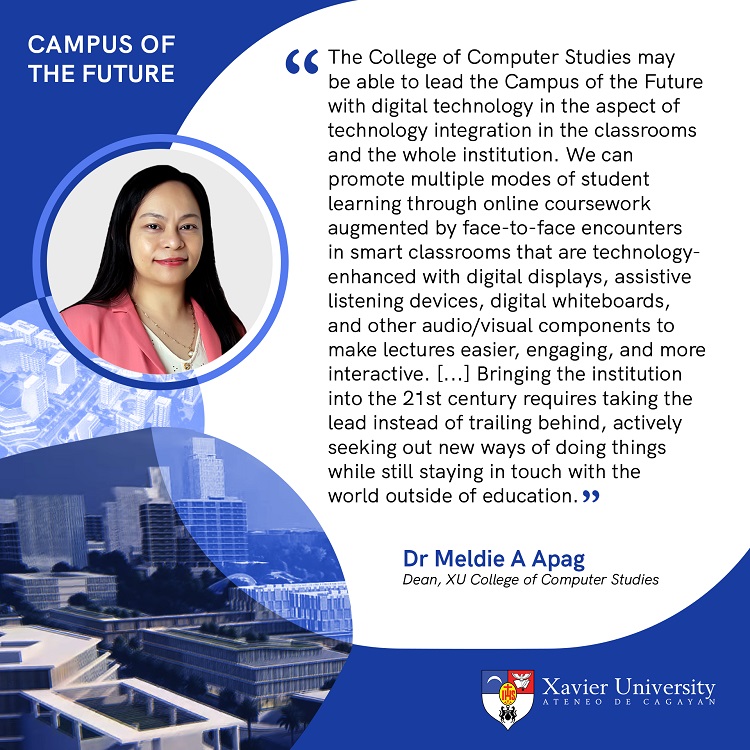
“Learning environments today need to embrace the variety of places, ideas, and people that the modern world demands and reflect the flexibility of space, time, people, and technology,” shares Dr Meldie A Apag of XU, dean of the College of Computer Studies of Xavier University – Ateneo de Cagayan.
Dean Apag was recently named as one of the fellows comprising the United Board’s 2022-2023 cohort. This program of the United Board for Christian Higher Education in Asia answers “the needs of leadership development for mid-career faculty and administrators from Asian colleges and universities.”
“Having been chosen as United Board Fellows for the 2022-2023 cohort, we will undergo eight months of intensive online training that will be curated and delivered by the Singapore Management University,” shares Dean Apag.
There will also be an optional two-week study trip either in or outside of one’s home country in Asia and a week-long in-person seminar in Singapore to conclude the one-year program.
Through this program, the United Board aims to develop dynamic leaders committed to the advancement of whole-person education within their home institutions.
Since 2002, nearly 300 Fellows from over 50 institutions in 11 countries and regions of Asia have been selected for this program.
Bringing Xavier Ateneo to the 21st century
Dean Apag is committed to helping in innovating the learning environment of Xavier Ateneo through the integration of information communication technologies (ICTs).
“Effective learning environments do not limit themselves to time or space but comprise a variety of support systems that take into consideration the ways in which we learn best as well as the unique learning needs of each student,” she shares.
“Our goal is always to create learning environments where educators and students can thrive. Technology can help seamlessly support these learning environments by building physical and digital arrangements.”
When asked about the role of the College of Computer Studies as the university moves toward a 21st-century learning setup, specifically for the Campus of the Future project, Dean Apag answers:
“The College of Computer Studies may be able to lead the Campus of the Future with digital technology in the aspect of technology integration in the classrooms and the whole institution. Modern classrooms must use technology as a tool to stimulate curiosity and inspire students’ desire to learn and teachers’ desire to teach. […] We may take part in the building of the Campus of the Future that takes a multimedia approach to learn core content, promote essential learning and innovation skills, build information, and even take responsibility for sustainability."
However, she knows that it is not enough to simply add technology to existing teaching methods.
“This is where we in the College of Computer Studies and as the Dean of the college can come in,” she continues. “We are entrusted not only to bring technology into the classrooms for the students and the faculty as we did during the onset of the pandemic through flexible learning, but strategically bring about the ability of our students and faculty to think critically and creatively, to collaborate with others, and to communicate clearly.”
Tech-future of the new campus
Since the Vatican's approval in 2021, the Campus of the Future project has not only received positive engagements but also messages of hope and excitement.
The project will not only involve an enormous physical transformation but most especially an introduction of new and relevant academic programs and research services fit for the demands of the 21st century.
Its masterplan presents state-of-the-art school buildings and administration facilities to cater to the academic courses of XU’s colleges and schools and is adaptable to developments in academic disciplines, 21st-century learning curricula, and technological innovations.
“We can promote multiple modes of student learning through online coursework augmented by face-to-face encounters in smart classrooms that are technology-enhanced with digital displays, assistive listening devices, digital whiteboards, and other audio-visual components to make lectures easier, engaging, and more interactive,” Dean Apag shares on what features could be installed in the new campus.
“Bringing the institution into the 21st century requires taking the lead instead of trailing behind, actively seeking out new ways of doing things while still staying in touch with the world outside of education.” ∎